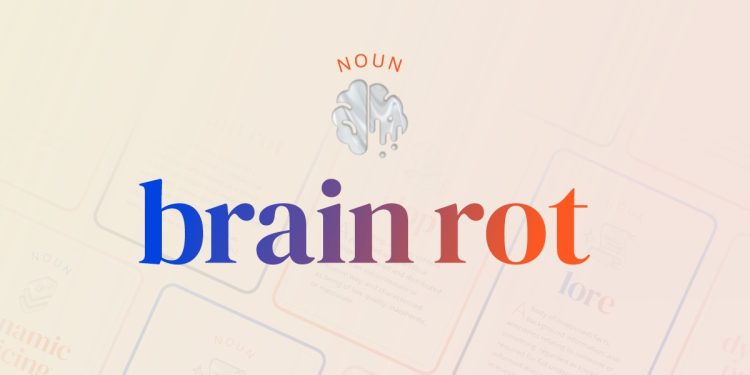Jakarta, Indonesia Sentinel — Oxford University Press has selected the terms “brain rot” as its 2024 Word of the Year, reflecting growing societal concerns over the mental toll of excessive online content consumption. The announcement followed a public vote involving over 37,000 participants voting for the terms.
Oxford University Press is celebrating the 20th anniversary of its lexicographers naming an English-language word or expression that reflects the world during the last 12 months throughout 2024.
Following weeks of public voting and extensive discussion, the experts reviewed the results alongside language data and public input and officially declaring “brain rot” as the 2024 Word of the Year.
Oxford Languages defines brain rot as a “decline in a person’s mental or intellectual state, often caused by overconsumption of trivial or unchallenging content, particularly found on online platforms.”
The term has gained traction in recent years, particularly among younger generations like Gen Z and Gen Alpha, who spend substantial time on social media. Oxford noted that the usage of the term brain rot reportedly increased by 230% between 2023 and 2024, as it took on new relevance in the digital era.
“These communities have amplified the expression through social media channels, the very place said to cause ‘brain rot’,” said Casper Grathwohl, President of Oxford Languages, as reported by BBC.
The selection highlights a broader cultural anxiety surrounding the negative effects of low-quality digital content on mental health.
Origins and Evolution
The phrase brain rot was first recorded in 1854 by American naturalist and writer Henry David Thoreau in his book Walden. Thoreau used the term to critique society’s tendency to simplify complex ideas into more palatable, less challenging concepts, a concern he explored while advocating for a simpler, nature-focused lifestyle.
In the modern context, brain rot has evolved to symbolize the effects of prolonged exposure to trivial or overstimulating online content, particularly through social media.
By 2024, “brain rot” has come to symbolize both the cause and consequence of this phenomenon, referring to the low-quality, superficial content often found on social media and the broader internet, as well as its perceived detrimental impact on individuals and society as a whole.
The Term “Demure” Named for 2024 Word of the Year
Initially popularized on social media platforms—particularly TikTok—among Gen Z and Gen Alpha, the term “brain rot” has now gained traction in mainstream journalism amid growing concerns over the negative effects of excessive online content consumption.
Public Growing Concerns
These extensive and prolonged exposure of low-quality social media content has increasingly been linked to poor mental health outcomes, particularly in children and teenagers. Experts warn that overconsumption of such material can lead to what is metaphorically described as “mental decay,” aligning with the modern usage of brain rot.
The term reflects public unease about the broader impact of virtual life and excessive screen time. Mental health professionals have called for greater awareness and proactive measures to limit exposure to harmful content, especially for younger, impressionable audiences.
Grathwohl noted that choosing brain rot as the Word of the Year highlights a critical moment where society grapples with the balance between digital engagement and mental well-being.
Despite its frequent use as a humorous term on social platforms, its selection as Word of the Year underscores serious concerns over its real-world consequences.
(Raidi/Agung)
























